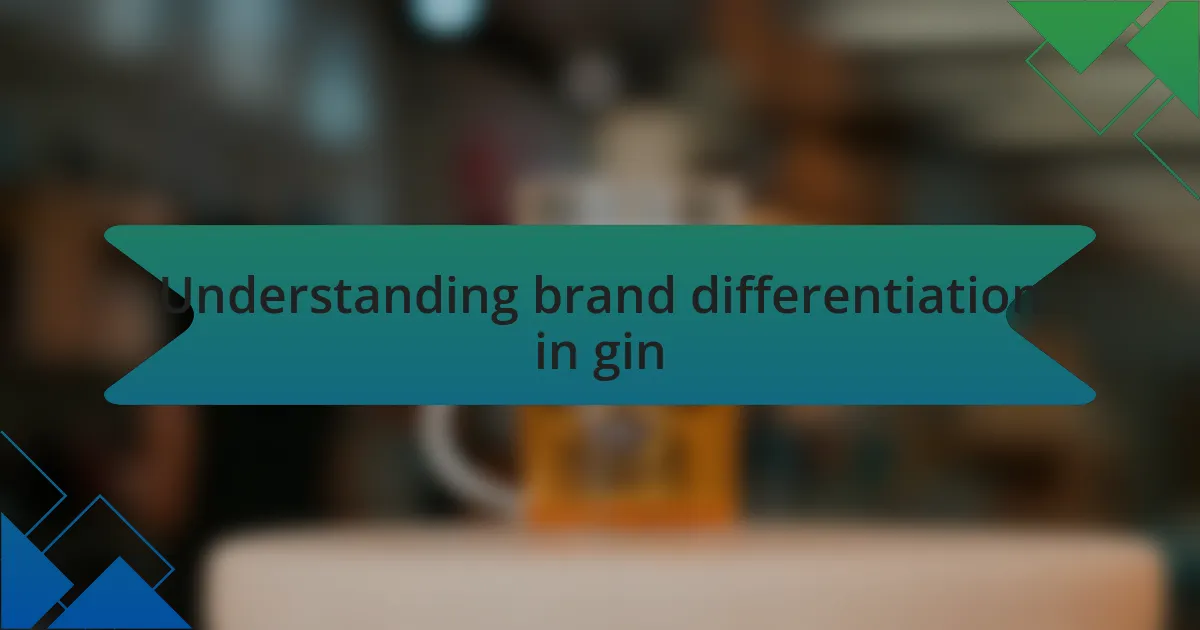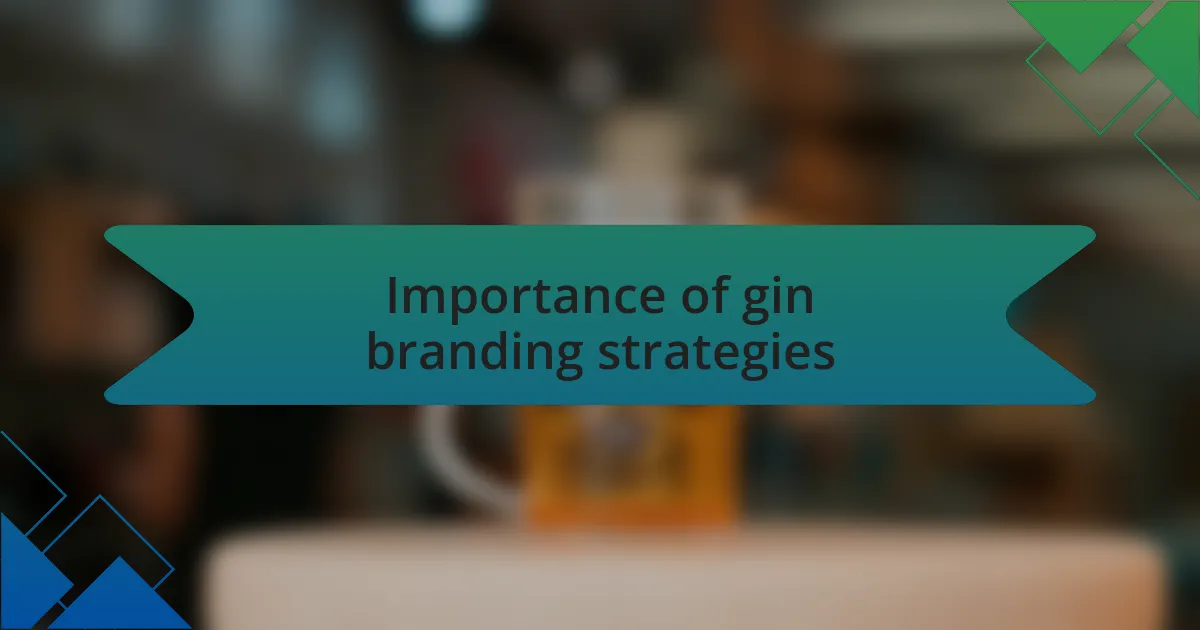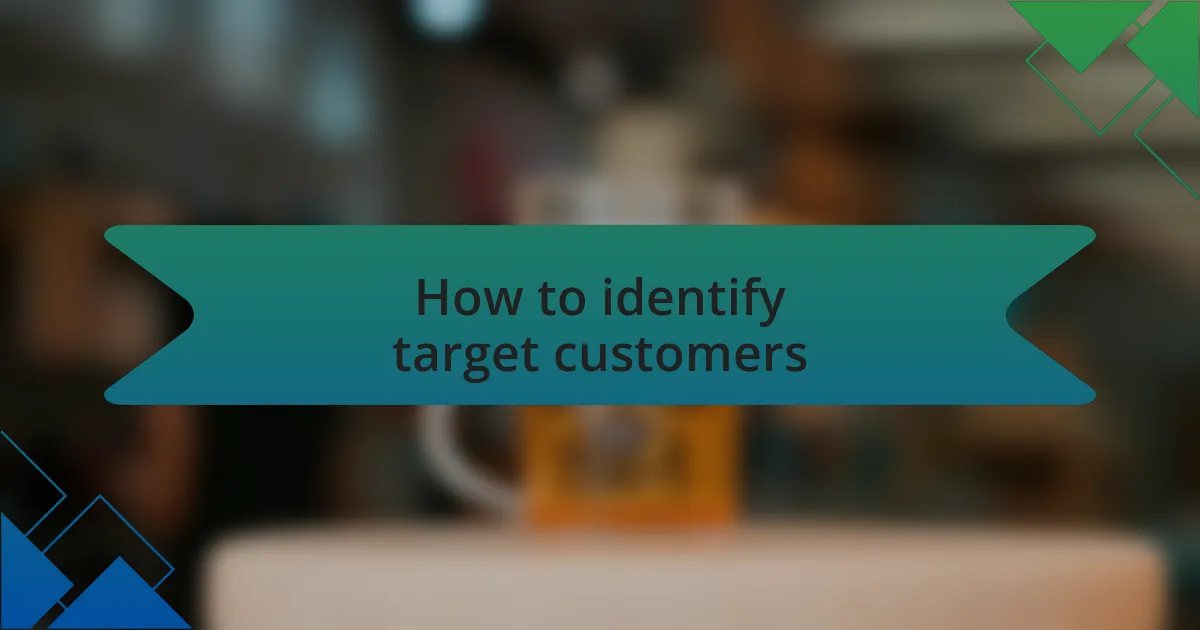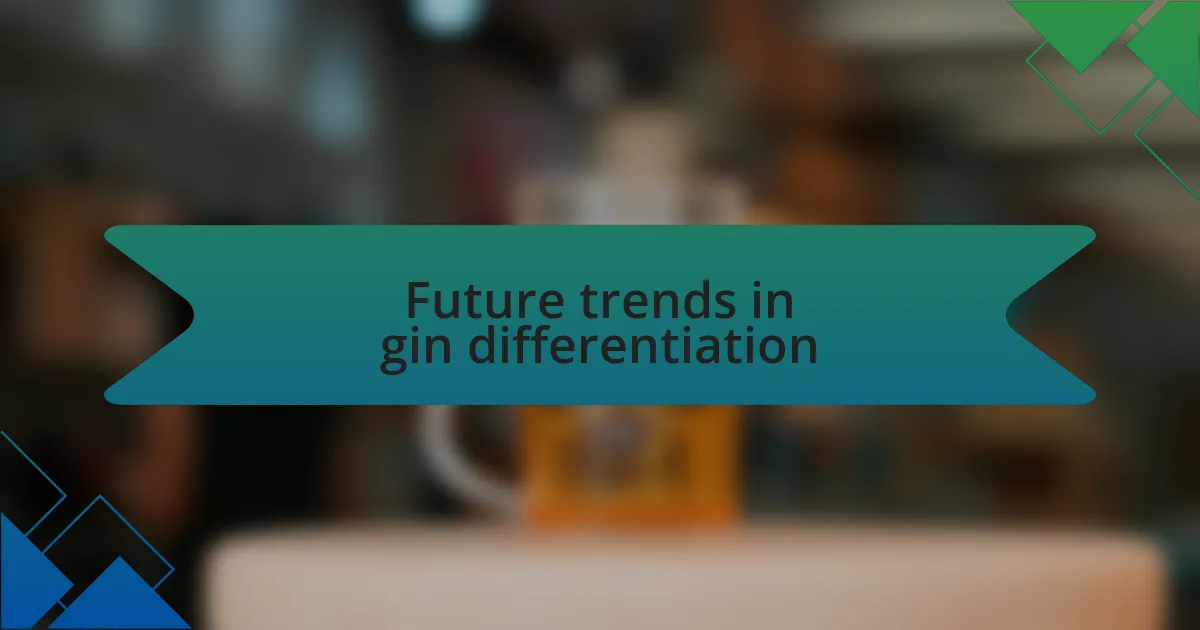Key takeaways:
- Brand differentiation in gin relies on unique storytelling and authentic connections to evoke emotional experiences.
- Effective branding strategies are vital in a competitive market, fostering customer loyalty through compelling narratives.
- Identifying target customers involves understanding consumer behavior and leveraging social media insights to align marketing approaches.
- Future trends in gin include a focus on sustainability, experimental flavors, and personalization to enhance consumer engagement and loyalty.

Understanding brand differentiation in gin
Brand differentiation in gin is a crucial aspect that separates one distillery from another. When I first explored the gin market, I was struck by how each brand tells its unique story, whether it’s through the ingredients sourced or the distillation process. Isn’t it fascinating how a distinct blend of botanicals can evoke a completely different experience?
The sensory journey of tasting a particular gin can be deeply personal. For instance, I remember trying a small-batch gin that featured wildflowers from the local countryside. The aroma transported me back to summer afternoons, highlighting how brands can build emotional connections through carefully selected flavors. How do you think your own memories influence your perception of a brand?
Ultimately, brand differentiation is about authenticity and storytelling. When I find a gin brand that truly embodies its heritage and values, it resonates with me on a deeper level. This connection not only enhances my appreciation of the gin but also influences my choices when stocking my home bar. What experiences shape your preferences when choosing a gin?

Importance of gin branding strategies
Effective gin branding strategies are essential in a saturated market where countless options vie for consumer attention. I often find myself gravitating towards brands that showcase a distinctive identity, whether it’s through their unique packaging or engaging storytelling. Have you noticed how a brand with a compelling narrative can stick in your memory, even among many others?
Consider the way a well-crafted brand can elevate the drinking experience beyond just taste. For example, I recall visiting a gin distillery where the founder passionately described the origins of their botanicals and the artistry behind their craft. This narrative not only enhanced my appreciation for that particular gin but also made me excited to share it with friends. Doesn’t it make you wonder how much a story can influence our choices when selecting a gin to enjoy?
Moreover, strong branding fosters customer loyalty in a way that goes beyond mere preference. When a brand resonates with its audience, it cultivates a community of loyal advocates. I often find myself following a brand’s journey on social media, rooting for their successes and feeling a part of their story. How important is it for you to feel connected to a brand while choosing your favorite gin?

How to identify target customers
Understanding your target customers in gin marketing requires a mix of research and intuition. I have found that analyzing purchase behavior, demographics, and even lifestyle preferences can reveal who your ideal customer really is. For instance, I remember one brand that thrived by focusing on millennials looking for artisanal products — it was a game changer for them.
Engagement with potential customers is another crucial step. When I attend gin festivals or tastings, the conversations I have often lead to valuable insights about what consumers desire in a brand. You might ask yourself: what trends can I identify from these interactions? Each person’s story can help you shape your marketing approach.
Lastly, leveraging social media analytics can fine-tune your understanding of customer interests. By observing which posts resonate, I’ve adjusted my strategy to align better with my audience’s preferences. Isn’t it fascinating how data combined with genuine connection can uncover the people who resonate most with your brand?

Crafting a unique brand story
Crafting a unique brand story is essential in differentiating your gin in a saturated market. I’ve often found that sharing the origin of your ingredients or the history of your distillation process can resonate deeply with consumers. For example, when I learned about a craft gin that highlighted its locally sourced botanicals, it sparked my interest and created an emotional connection — something I recognized frequently motivates consumer loyalty.
One memorable experience I had involved a brand that tied their gin’s narrative to a local legend. This storytelling approach didn’t just sell a product; it created an immersive experience that brought consumers into a world crafted around the gin. Have you considered how much more effective your brand could be if you wove a compelling tale into your marketing? Sharing personal anecdotes or values can create authenticity that stands out.
Moreover, as I reflect on my interactions with different brands, the ones with a strong, genuine story often spark the most engagement. It’s amazing to see how consumers relate better to a narrative that reflects their own beliefs and passions. In my experience, the heart of branding lies in this genuine connection — it fosters trust and loyalty that can truly elevate your gin above the competition.

Personal experiences with gin brands
When I first tasted a gin from a small distillery in my hometown, it was the story behind it that captivated me. The distiller shared how they used wild herbs foraging from nearby forests, and as I sipped, I could almost taste the landscape — that experience made me a loyal customer. It’s incredible how a simple narrative can transform a drink into a cherished memory.
Another gin brand that left a lasting impression on me was one that collaborated with a local artist to design their labels. This artistic approach not only made each bottle a collector’s item but also created an emotional connection. I often ponder how such partnerships can elevate the perception of a brand and encourage consumers like me to explore and share more about what they love.
I remember attending a gin tasting event where the host emphasized the unique flavor profiles of each poured sample. What struck me most was the way the brand representatives highlighted their commitment to sustainable practices. This genuine dedication appealed to my values, making me wonder — how can others in the industry adopt similar storytelling methods to create more vibrant consumer connections? It really reinforced the idea that branding is not just about the spirit itself; it’s about crafting experiences that resonate on a deeper level.

Future trends in gin differentiation
As I look to the future, I see gin brands increasingly focusing on sustainability as a core value. I’ve noticed that consumers are more curious about the environmental impact of their purchases. Brands that embrace eco-friendly practices, such as using locally sourced botanicals or implementing green production methods, not only resonate with me but also enhance their appeal to a growing segment of conscious drinkers. How will these choices redefine the storytelling around gin?
Another trend that excites me is the rise of experimental flavors and limited editions. I recall trying a unique lavender-infused gin at a local bar, and it left a lasting impression. The creativity behind such variations sparks conversations among gin enthusiasts, encouraging them to seek out and share these distinctive experiences. What if brands focused on creating a rotating selection of seasonal gins to keep consumers engaged and curious?
Personalization is also becoming a significant trend in the world of gin. I’ve seen brands exploring tailored services where you can create your own bespoke gin, choosing botanicals that resonate with your taste. This trend could foster a deeper connection between consumers and the brand. I often wonder how these individualized experiences will shape consumer loyalty in an ever-competitive market.